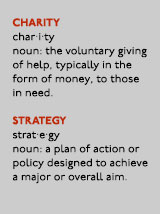John Gardner, a great American and renowned philanthropist once said, “Wealth is not new. Neither is charity. But the idea of using private wealth imaginatively, constructively, and systematically to attack the fundamental problems of mankind is new.”
 Indeed, there are generous individuals contributing innumerable magnanimous gifts on a daily basis in every corner of the world.
Indeed, there are generous individuals contributing innumerable magnanimous gifts on a daily basis in every corner of the world.
Well-meaning benefactors, with disparate approaches, have flooded under-resourced populations with goods and services meant to stem many ailments. Intervening in cyclical famine, curbing the effects of natural disasters, and stopping the spread of pandemic and epidemic ravages are indispensable gifts in times of dire need.
Dallas boasts one of the most robust philanthropic landscapes in the world. Over the last decade, our region generated more wealth per capita than almost any other region in the United States.
With such wealth comes an even greater responsibility to assist others. We can also safely say that our fair city has answered the call time and time again.
The Communities Foundation of Texas is one of the largest public foundations in the country. The Dallas Foundation is one of the oldest community foundations in the state. Dallas native Lyda Hill and Harold Simmons (deceased) both signed Warren Buffet’s pledge to spend a majority of their net worth in their lifetime—not to mention the generosity of so many others, many of whose names adorn our most hallowed and prestigious institutions.
Yet, when we look at the persisting and chronic issues of our city’s social, cultural, and economic challenges, we don’t see levels of scaled success. As a region, we are making progress but still struggle to prioritize our giving in proportion to how much we give.
Organizations such as the Commit! partnership have started to build regional infrastructure and dialogue in their respective fields, but enacting those identified strategies needs to happen at an aggregated level amidst the regional funding entities.
The ability to consistently act on data and measure success against key metrics has increasingly showed significant results.
At times we cannot get out of the way of our own charity, in order to establish an effective philanthropic strategy. We want to see resources address everything. Our emotional connection to a concept, idea, or program can override our ability to implement a plan that we have committed to in word or intent.
Why is this important?
The ability to consistently act on data and measure success against key metrics has increasingly showed significant results.
Bottom-line: philanthropic impact is directly proportional to resources, discipline, and prioritization.
A recent philanthropic effort led by the Warren Buffett family focused on systematically reducing teenage and unwanted pregnancies in the state of Colorado. State public health employees and nonprofit providers leveraged a low publicity, multi-year campaign to provide free and long term contraception for young, low income women.
This privately funded venture reduced teen pregnancy by 40 percent over a five-year period (2009-2013). There was also a 40 percent statewide reduction in abortions. By flying under the political radar, focusing on long-term impact, and galvanizing multiple providers around shared goals, the state was able to accomplish what was previously thought to be impossible.
Funders that are truly leading the way in Dallas have established and codified initiatives that imbue their charitable organizations with strategy.
- Aligned to a common regional goal
- Consistently measured and evaluated
- Maintain scalable components
- Have diversified funding streams
- Focus on the most effective lever to close a gap
I’ll have more about these funders and organizations in my next column, but the bottom-line is this: philanthropic impact is directly proportional to resources, discipline, and prioritization. Institutionalizing those elements in the Dallas philanthropic space is gaining momentum.
When we match our level of charity with the same level of strategy we will see transformational change. Quite frankly our most vulnerable populations deserve it.




























